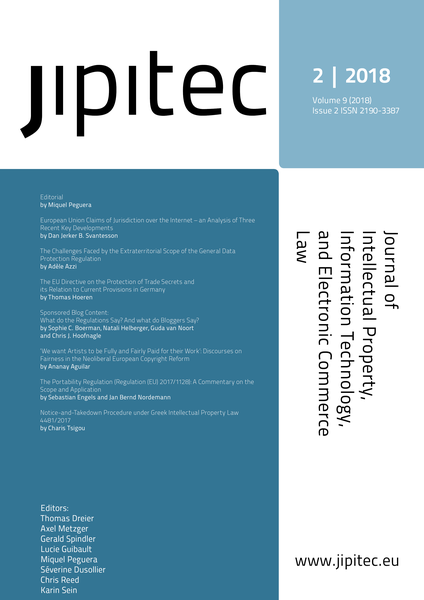Sponsored Blog Content: What do the Regulations Say? And what do Bloggers Say?
Keywords:
Native advertising, advertising regulation, advertorial, influencer marketing, legal comparrison (US, European Law), sponsored content, unfair commercial practiceAbstract
Influencer marketing – the use of opinion leaders such as bloggers with many followers and readers to disseminate product messages – is gaining advertisers’ interest. This paper presents the law and self-regulative provisions concerning blog advertising in both Europe and the US and documents the actual practice of disclosing blog advertising: whether and if so how, bloggers disclose influences from advertisers, and how these disclosures align with the regulations in place. The Federal Trade Commission Act and related guides in the US, and self-regulative provisions in Europe urge advertisers and endorsers, such as bloggers, to disclose any commercial relationship. These disclosures should be clear and conspicuous because advertising to consumers should be recognizable as such. Although advertisers increasingly encourage bloggers to promote products, it is unclear whether bloggers comply with disclosure requirements. To test compliance with disclosure requirements, we performed a content analysis of 200 blog posts drawn from the top-20-ranked sites in the Netherlands and the United States. We found that 65% of the posts mention brands and products. Yet, only 15% of the blog posts provided some commercial sponsorship disclosure. To determine whether posts mentioning brands were organic, unsponsored endorsements, we made repeated attempts to contact authors. Of those that responded, most claimed that their writing was not sponsored, but a small number received remuneration and did not disclose it. Furthermore, among the disclosing bloggers, we found regular problems in their sponsorship disclosures: many only state ‘sponsored’ or ‘affiliated link’; only 1/3 stated the name of the actual sponsor; most require the users to “scroll down,”; and most are in the same font as ordinary text. Our findings raise several regulatory issues; namely, the need for more concrete guidance on disclosure format, and it highlights the difficulty of monitoring compliance with the existing provisions. In so doing, our findings also provide important input for the European Commission’s Regulatory Fitness and Performance exercise, which tackles, among others the Unfair Commercial Practice Directive.Published
2018-10-23
Issue
Section
Artikel

